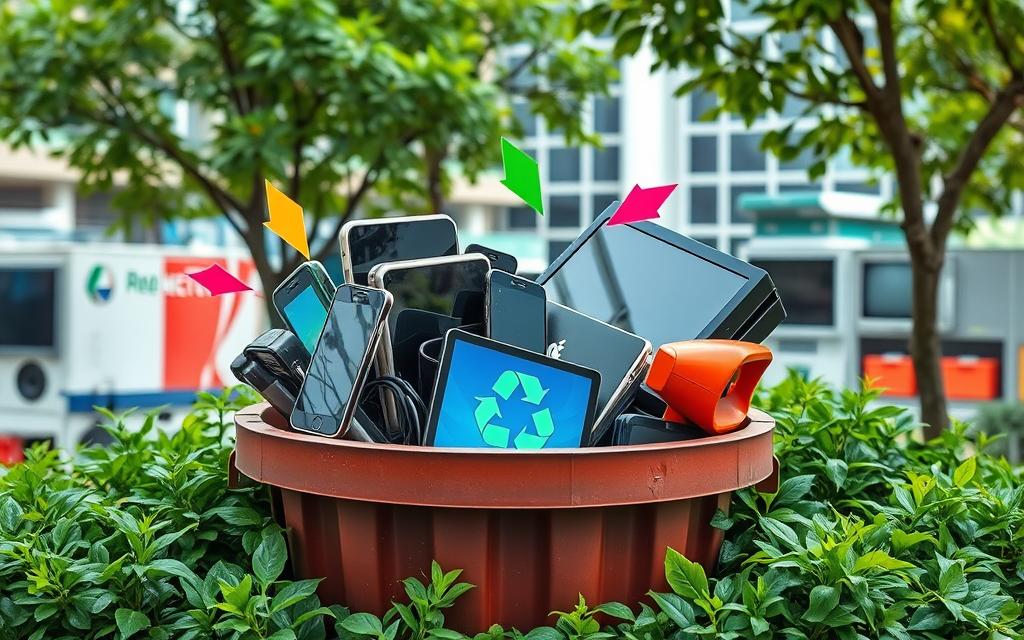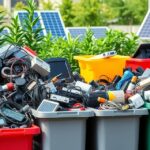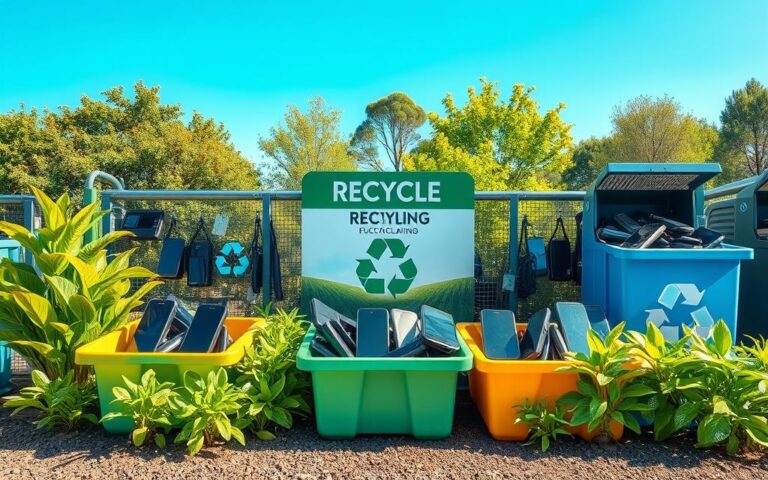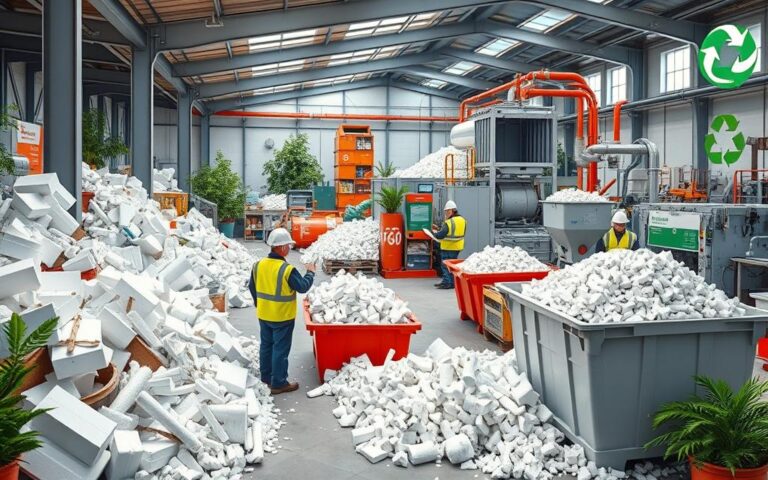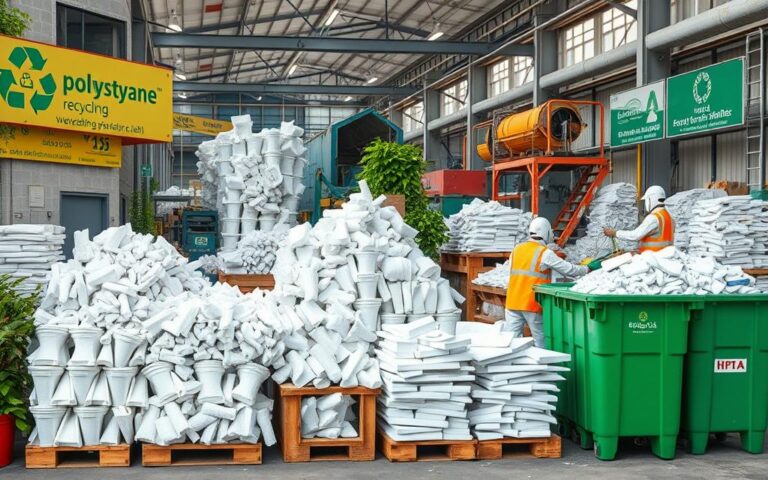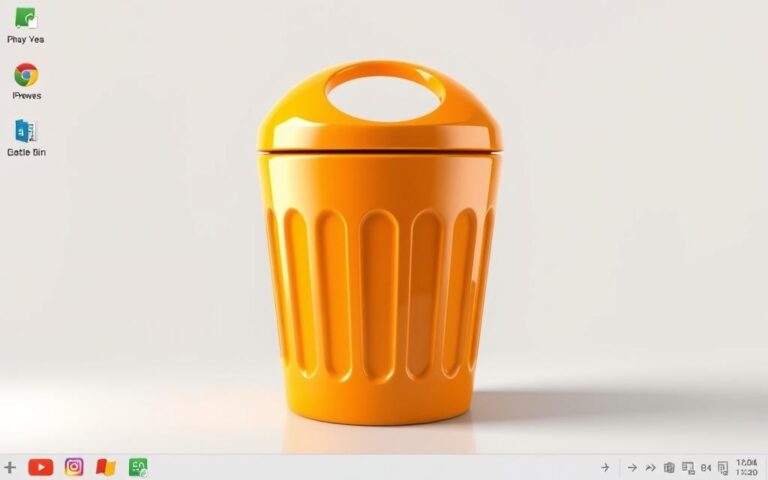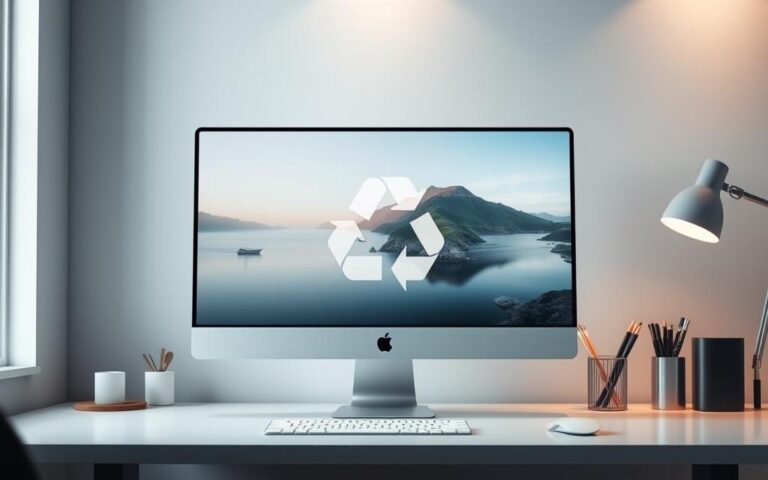Where Can You Recycle Old Electronics? Safe Disposal Tips
Technology changes very fast today. Because of this, it’s vital to know how to dispose of old electronics safely. Every year, the world creates over 136 billion pounds (62 billion kilograms) of electronic waste. But, only a small part of this e-waste is recycled properly. This leads to big problems for our environment.
It’s important to learn where you can recycle old electronics. This helps reduce e-waste and saves natural resources. Many electronic devices contain harmful substances. They can harm our planet badly. By using local recycling programs or taking part in retailer initiatives, you can make a difference. Let’s work together to protect our environment from the damage caused by old technology.
The Importance of Recycling Old Electronics
Recycling old electronics brings big benefits for both people and the planet. Around 60 million tons of e-waste are produced worldwide every year. It’s vital to recycle these items properly. This not only protects the environment but also recycles valuable materials.
Protecting the Environment
Electronic devices contain dangerous substances like lead and mercury. These can harm our ecosystems and health if not disposed of correctly. Recycling helps reduce these risks. It allows us to reuse materials such as plastics, metals, and glass, saving the earth’s resources.
Minimising E-waste in Landfills
Circuit boards are much richer in gold than ore, highlighting e-waste’s value. By recycling, we avoid dumping electronics in landfills. This is good for everyone. Proper e-waste recycling follows laws in 25 states and the District of Columbia. It shows we care about managing waste sustainably.
Safeguarding Personal Information
Our electronic devices hold private data that needs protection. Certified recycling programs make sure our information stays safe. They use methods like shredding hard drives and securely erasing data. This keeps our personal details safe while helping the environment.
| Aspect | Benefit of Recycling |
|---|---|
| Environmental Protection | Reduces harmful waste in landfills |
| E-waste Reduction | Minimises the volume of electronic items discarded |
| Personal Data Security | Safeguards sensitive information from unauthorized access |
| Recycling Benefits | Recovers valuable materials for reuse |
Types of Electronics You Can Recycle
Recycling helps us manage e-waste and saves precious materials from being wasted. Many electronic devices can be recycled. This lets us recover valuable resources and lessen environmental harm.
Computers and Laptops
Computers and laptops add a lot to types of e-waste. They have metals like gold and copper inside. These metals can be taken out and reused. In several places, you can recycle computers and laptops. Companies like Dell and Best Buy offer recycling programmes.
Smartphones and Tablets
Many replace their smartphones and tablets frequently. This has increased the need for smartphones recycling. From 41 thrown away phones, 1 gram of gold can be got. Recycling them saves resources and protects our planet.
Digital Media Devices and Accessories
Digital devices like cameras and media players, along with their accessories, are often forgotten. They end up causing pollution in landfills. By recycling these items, we can get back their materials. This stops them from harming the environment.
Gaming Consoles and Peripherals
Gaming consoles and their parts are recyclable electronics, too. They’re often thrown away fast but have metals and plastics that can be reused. Recycling these helps in creating a greener future and reduces environmental damage.
If you’re not sure what devices you can recycle, check out this guide on recyclable electronics. It gives detailed info on how to recycle all kinds of electronic goods. This guide helps consumers deal with e-waste in a responsible way.
Where Can You Recycle Old Electronics?
It’s important to find the right spots to recycle old electronics. You have many choices, like shops, local initiatives, and charities focused on e-waste. This helps keep our planet cleaner.
Retailer Recycling Programs
Stores like Best Buy and Staples have electronics recycling programmes. They let you drop off electronic items safely. They’ll tell you what they accept and follow all rules to protect the environment. Find a nearby store to see where you can recycle electronics and help our future be greener.
Local Government Initiatives
Local authorities work to make recycling easier for everyone. Michigan’s Electronic Waste Take Back Program is a good example. It ensures safe recycling of devices and makes manufacturers responsible. Places like SOCRRA’s Recycling Drop-off Center, Ecycle in Southfield, and ERG Environmental Services in Livonia are key. They offer easy drop-off for recycling without needing to wait or book.
Non-profit Organisations and Charities
Charities and non-profit organisations also play a big role in recycling electronics. They team up with communities to gather and recycle old gadgets safely. Helping these groups means you’re responsibly getting rid of electronics and supporting a cleaner environment.
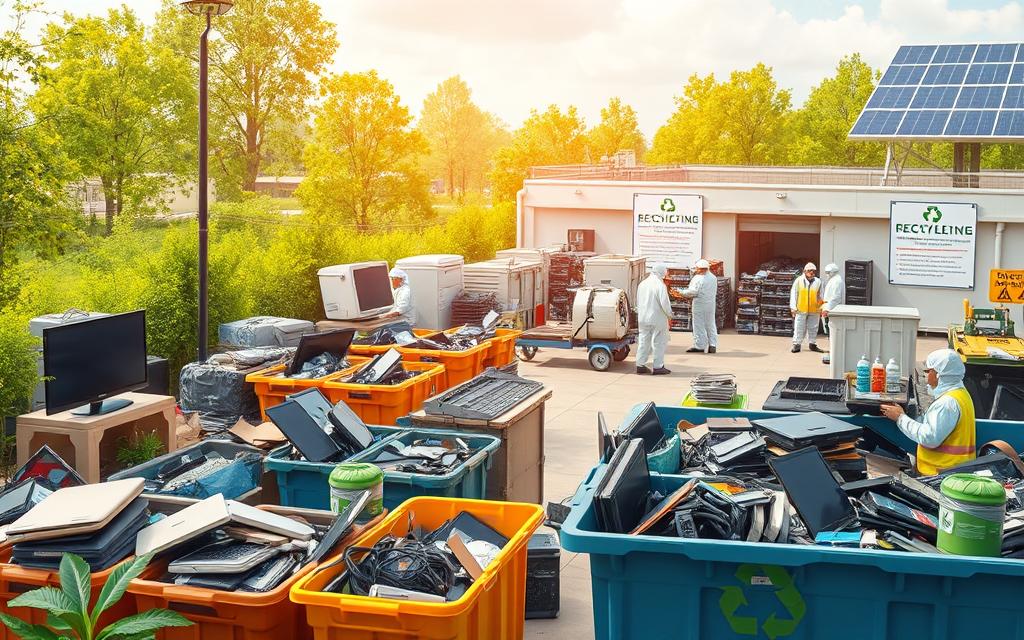
| Recycling Option | Location | Appointment Required | Accepted Items |
|---|---|---|---|
| SOCRRA’s Recycling Drop-off Center | Appointment only for specific communities | Yes | Monitors, CPUs, TVs, radios, cell phones |
| Ecycle | 29699 Southfield Road, Southfield | No | Monitors, CPUs, TVs |
| ERG Environmental Services | 13040 Merriman Road, Livonia | No | Includes household hazardous waste |
Best Practices for Safe Disposal of Old Electronics
Ensuring safe disposal of old electronics involves careful steps. The first thing to do is erase personal data securely. This helps avoid identity theft and data breaches. Using factory resets and special disk wiping software is crucial for proper data erasure.
Erasing Personal Data Securely
When getting devices ready for recycling, following the National Institute of Standards and Technology (NIST)’s advice is key. Techniques like secure erase, overwriting, and physical destruction are essential. Physical destruction ensures data can’t be retrieved. This includes methods like disintegration or shredding. The Environmental Protection Agency (EPA) provides guidelines on these methods, helping safe electronics disposal.
Choosing Certified Recyclers
Picking certified recycling centres is vital for responsible e-waste handling. Check if they follow strict environmental standards from certifications like the e-Stewards or the R2 Standard. These certifications mean that electronics get recycled properly and ethically, benefiting our environment.
Understanding Local Regulations
Knowing local e-waste laws is crucial. Many areas have rules to encourage recycling and lessen landfill use. Getting familiar with these laws helps make recycling easier. Retailers and groups like Best Buy and Goodwill offer easy e-waste recycling options, aiding in following local guidelines.
By adhering to these practices, you help protect our planet and keep your data safe. For more information on disposing of old electronics safely, check out these safe disposal tips.
What to Know Before You Recycle
Recycling old electronics needs you to think about many things. This helps us get the most benefits and ensures we dispose of them responsibly. Many shops offer trade-in programmes. Here, you can swap your old devices for store credit or other rewards. Check these options before giving up your gadgets. They might surprise you with financial benefits.
Check for Trade-in Options
Stores like Apple, Amazon, and Best Buy have trade-in schemes. These schemes encourage us to bring back our old devices. In return, we get gift cards or discounts. Taking part in these schemes reduces our electronic waste. At the same time, it can boost our savings.
Assessing the Condition of Your Devices
It’s important to check how well your device works before recycling. Devices that work are usually more valuable in trade-ins. Look over your electronics to find parts that still work or can be reused. This helps you know if you should recycle them or consider trading them in.
Preparing Devices for Recycling
There are right steps to get your electronics ready for recycling. First, delete all personal data to avoid data theft. Then, follow the specific instructions from recycling programmes. They guide you on how to take apart or pack up your devices for recycling. Doing this right helps keep the recycling process safe for the environment.
Conclusion
Recycling old electronics is key to protecting our environment and raising awareness about e-waste. The wrong disposal has serious effects, as electronics have dangerous substances. These can damage our ecosystems. By disposing of electronics properly, we help reduce e-waste and save natural resources.
Recycling is not just good for the earth; it also boosts our economy. It creates jobs and supports our local communities. The industry of recycling electronics helps lessen pollution. It also encourages actions like local recycling days and programs where manufacturers take back products. This helps everyone get access to digital tools.
It’s also vital to make sure that when we recycle, we do so securely. This protects our private information from being stolen. Knowing how to recycle correctly helps us all. This way, we can ensure a greener future. We play a big part in cutting down e-waste’s impact on the earth.
FAQ
What is e-waste and why is it a problem?
E-waste means thrown away electronic gear like computers, phones, and gaming devices. It’s a big issue because it creates millions of tonnes of waste each year. This waste has dangerous stuff like lead and mercury. These can harm our planet and health if not tossed away right.
How can I find a place to recycle my old electronics?
You can recycle old electronics in several ways. Retail recycling programmes at places like Best Buy and Staples are options. You can also use local government e-waste spots and non-profit groups that help reuse electronics.
What should I do to prepare my electronics for recycling?
Before you recycle, make sure to erase your private info safely. This means doing factory resets and using software to clean disks. It’s also key to follow the recycler’s steps for handling your gadget right.
Are there any financial benefits to recycling my electronics?
Yes, some shops like Apple and Amazon give you money or credit for trading in old gadgets. The amount depends on how well your device works and its shape.
What kind of electronics can I recycle?
You can recycle a bunch of electronics. This list includes computers, laptops, phones, tablets, digital cameras, media players, and gaming consoles. Their accessories can also be recycled.
Why is recycling old electronics important for protecting the environment?
Recycling cuts down the amount of e-waste in landfills. This action helps keep the air and water clean. It also saves valuable resources and stops toxic stuff from hurting nature.
How can I ensure I am using a certified recycler?
For safe and right recycling, look for recyclers with certification from well-known organisations. They must follow strict e-waste rules and ways of getting rid of it.
What should I know about local regulations for e-waste disposal?
E-waste rules can be different depending on where you live. So, it’s wise to talk to your local council or recycling place. This way, you can do the right thing when throwing away old electronics.
Can I recycle accessories such as chargers and cables?
Yes, lots of recycling programmes take back accessories like chargers and cables. They also have materials that can be recycled.
What happens to my electronics once I recycle them?
Once recycled, your electronics are taken apart and sorted. Things like metals and plastics are taken out and made into new items. And, anything harmful is gotten rid of safely to avoid hurting the environment.

